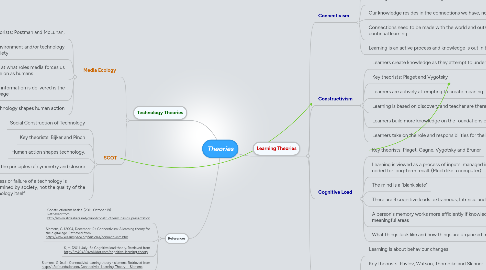
1. Technology Theories
1.1. Media Ecology
1.1.1. Key theorists: Postman and McLuhan,
1.1.2. How the environment and/or technology affects society
1.1.3. Looks at what roles media forces us to take on as humans
1.1.4. How information is delivered is the message
1.1.5. Technology shapes human action
1.2. SCOT
1.2.1. Social Construction of Technology
1.2.2. Key theorists: Bijker and Pinch
1.2.3. Human action shapes technology.
1.2.4. Looks at the principles of symmetry and closure
1.2.5. Success or failure of a technology is determined by society, not the quality of the technology itself
2. References
2.1. Constructionism basics. (2011, October 18). Retrieved from http://www.slideshare.net/olupo/constructivism-basics-presentation
2.2. Siemens, G. (2004, December 12). Connectivism: A learning theory for the digital age. Retrieved from http://www.elearnspace.org/Articles/connectivism.htm
2.3. S, M. (2011, July 16). Cognitive load theory. Retrieved from http://im404504.wikidot.com/cognitive-learning-theory
2.4. Siemens, G. (n.d.). Connectivist learning theory - siemens. Retrieved from http://p2pfoundation.net/Connectivist_Learning_Theory_-_Siemens
3. Learning Theories
3.1. Connectivism
3.1.1. Key Theorists: Siemens and Downes
3.1.2. Learning is the process of creating connections and developing a network
3.1.3. Our knowledge resides in the connections we have, not in the individual themselves
3.1.4. Connections need to be made with the world and outside knowledge in order to facilitate continual learning
3.1.5. Learning is an active process and knowledge is out in the world for the learner to find
3.2. Constructivism
3.2.1. Learners create knowledge as they attempt to understand their experiences
3.2.2. Key theorists: Piaget and Vygotsky
3.2.3. Learners are actively attempting to create meaning
3.2.4. Learning is based on discovery and teacher are there to facilitate this type of learning.
3.2.5. Learners build more knowledge on the foundations of previous learning
3.2.6. Learners take on the role and responsibilities for their own learning
3.3. Cognitive Load
3.3.1. Key theorists: Piaget, Gagne, Vygotsky and Bruner
3.3.2. Learning is viewed as a process of inputs, managed in short term memory, and coded for long-term recall. (Much like a computer)
3.3.3. The mind is a "blank slate"
3.3.4. There are 3 cognitive loads: extraneous, Intrinsic and germane.
3.3.5. A person's memory works more efficiently if knowledge and information is "chunked" into meaningful areas
3.3.6. What things look like and how things are organized matter
3.4. Behaviourism
3.4.1. Learning is about behaviour changes
3.4.2. Key theorists: Pavlov, Watson, Thorndike and Skinner
3.4.3. Environmental stimuli is process through the brain, which is a "black box" that we cannot fully understand, and the outcome of that processing is learning
3.4.4. Learning is the connection of stimulus and response.
3.4.5. Teacher is present to provide stimulus and feedback to facilitate further behavioral learning
